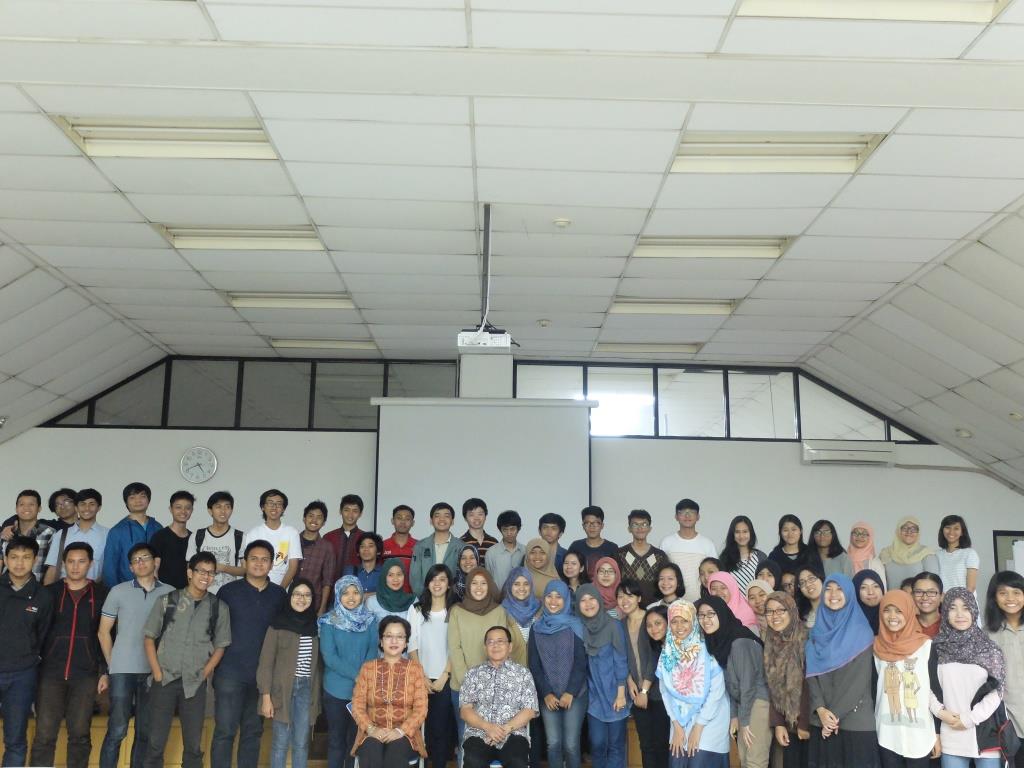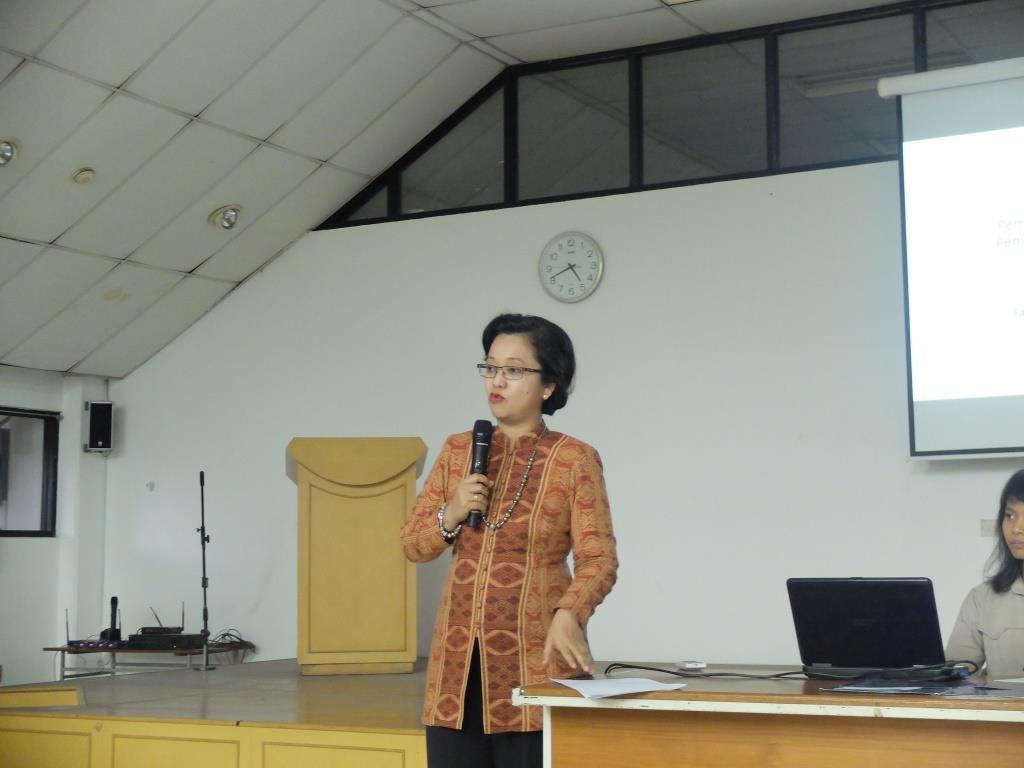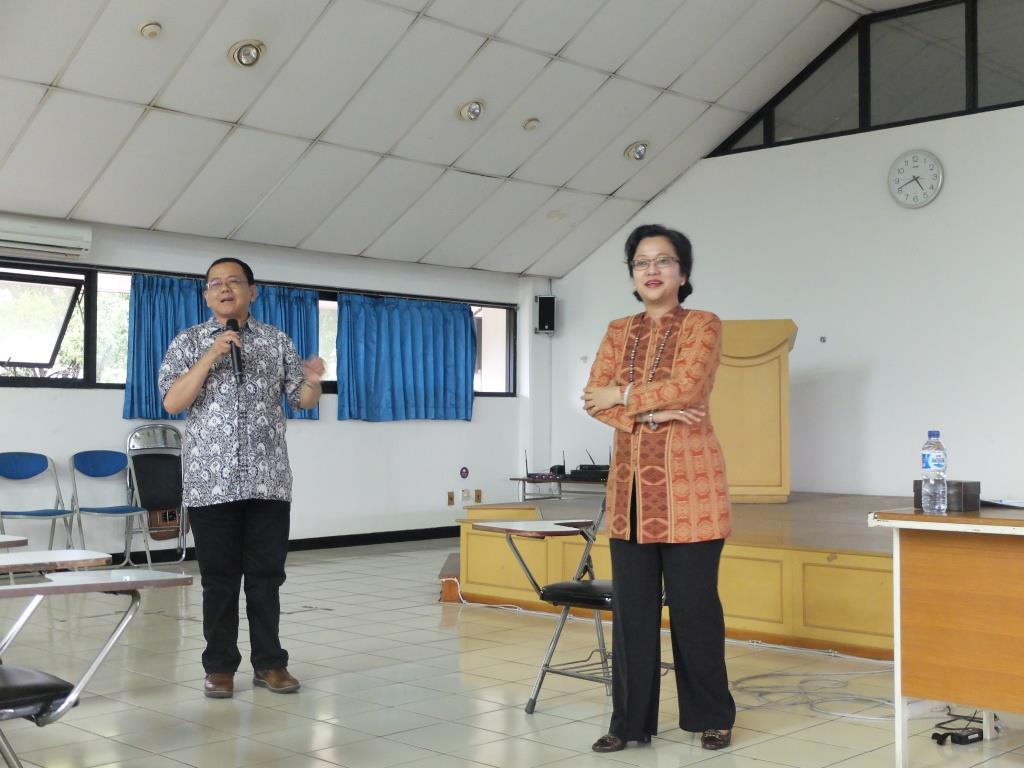Lecture Planning and Political Law Professor Dr Armida S. Alisjahbana

 BANDUNG, itb.ac.id - Planning and Politics course on Friday (05.12.14) in the Multipurpose Room PWK bring a guest lecture as a filler material. The guest was Prof. Dr Armida S. Alisjahbana that the Planning Minister of United Indonesia Cabinet. Subjects who take shelter in City and Regional Planning courses (PWK) ITB was not only attended by students PWK alone. However, more diverse, among others, was a student of Civil Engineering, Geodesy, Engineering Physics, and Computer Science. In this lecture, Armida explained on 'Development of Politics in the Medium Term Development in Indonesia'.
BANDUNG, itb.ac.id - Planning and Politics course on Friday (05.12.14) in the Multipurpose Room PWK bring a guest lecture as a filler material. The guest was Prof. Dr Armida S. Alisjahbana that the Planning Minister of United Indonesia Cabinet. Subjects who take shelter in City and Regional Planning courses (PWK) ITB was not only attended by students PWK alone. However, more diverse, among others, was a student of Civil Engineering, Geodesy, Engineering Physics, and Computer Science. In this lecture, Armida explained on 'Development of Politics in the Medium Term Development in Indonesia'.
First Armida confirms that there has been a paradigm shift reform and development in Indonesia. Oriented its original center or centralized, decentralized system has now been running. There were three main things that need to be observed after the crisis of 1997, Armida mention it was globalization and regionalization, a democratization process, and the process of regional autonomy. However, according to him, was not fully understood by the public. "In fact, including policy makers do not understand. Paradigm in communities was not uniform," said Armida.
This year, Bappenas was preparing finalization of the National Medium Term Development Plan (RPJMN) 2015-2019.Materi of the technocratic plans include the strategic environment and the main tantanan development, technocratic framework of medium-term development, political development agenda, law, defense, and security, as well as the development agenda of the political field.
 Strategic environment discussed was the geo-global and regional economies of Indonesia. It also alludes geopolitical and global and regional constellation. Other strategic matters was that the demographic bonus will Indonesia get up to about 2030. Demographic Bonus perceived as opportunities acceleration of economic growth. This was due to the decreasing number of dependency (dependency ratio). That is, the productive age population in Indonesia was much higher than the unproductive. "If supported policies and proper preparation, it will increase the productivity of the economy," said Armida.
Strategic environment discussed was the geo-global and regional economies of Indonesia. It also alludes geopolitical and global and regional constellation. Other strategic matters was that the demographic bonus will Indonesia get up to about 2030. Demographic Bonus perceived as opportunities acceleration of economic growth. This was due to the decreasing number of dependency (dependency ratio). That is, the productive age population in Indonesia was much higher than the unproductive. "If supported policies and proper preparation, it will increase the productivity of the economy," said Armida.
Armida provide points of the main challenges in development. The challenge was the high economic growth and sustainable development, acceleration of distributive justice, sustainable development, political stability and security, governance effective and efficient bureaucracy, fighting corruption, improving the quality of human resources, the gap between regions, and accelerating the development of marine. All of these challenges have been accommodated in RPJMN 2015-2019 entitled 'Building Strong, Inclusive and Sustainable'. Then used as a basis for leading developed countries in 2025-2030.
State Development and Politics Need to Get Started
 In RPJMN, also political development agenda. One of the policy direction was to increase the role of democratic institutions and encourage stronger partnerships between government, private, and civil society. The strategy has been designed towards the policy include the development of a democratic electoral policy and strengthening the organization of state institutions and relations between institutions of democracy to support effective public policy.
In RPJMN, also political development agenda. One of the policy direction was to increase the role of democratic institutions and encourage stronger partnerships between government, private, and civil society. The strategy has been designed towards the policy include the development of a democratic electoral policy and strengthening the organization of state institutions and relations between institutions of democracy to support effective public policy.
Armida argues political communication needs to run properly. Especially between the president and parliament. According to him, the President needs to build an effective political communication with political power or political parties, especially in the discussion of government policies and programs that need to be approved by Parliament. If only rely on the running state budget in 2015, clearly not accommodate RPJMN. "If this is the case, will only 're-labeling only of the previous government's policy. There needs to be an improvement in the implementation," said Armida. However, experience has been very pronounced constraints in implementing the plan. "The problem could be in the regulations, many laws which turned out to collide, less budget, institutional sometimes not ready. If not prepared since the beginning, we would run out of time to become a developed country," said Armida.
This year, Bappenas was preparing finalization of the National Medium Term Development Plan (RPJMN) 2015-2019.Materi of the technocratic plans include the strategic environment and the main tantanan development, technocratic framework of medium-term development, political development agenda, law, defense, and security, as well as the development agenda of the political field.
 Strategic environment discussed was the geo-global and regional economies of Indonesia. It also alludes geopolitical and global and regional constellation. Other strategic matters was that the demographic bonus will Indonesia get up to about 2030. Demographic Bonus perceived as opportunities acceleration of economic growth. This was due to the decreasing number of dependency (dependency ratio). That is, the productive age population in Indonesia was much higher than the unproductive. "If supported policies and proper preparation, it will increase the productivity of the economy," said Armida.
Strategic environment discussed was the geo-global and regional economies of Indonesia. It also alludes geopolitical and global and regional constellation. Other strategic matters was that the demographic bonus will Indonesia get up to about 2030. Demographic Bonus perceived as opportunities acceleration of economic growth. This was due to the decreasing number of dependency (dependency ratio). That is, the productive age population in Indonesia was much higher than the unproductive. "If supported policies and proper preparation, it will increase the productivity of the economy," said Armida.Armida provide points of the main challenges in development. The challenge was the high economic growth and sustainable development, acceleration of distributive justice, sustainable development, political stability and security, governance effective and efficient bureaucracy, fighting corruption, improving the quality of human resources, the gap between regions, and accelerating the development of marine. All of these challenges have been accommodated in RPJMN 2015-2019 entitled 'Building Strong, Inclusive and Sustainable'. Then used as a basis for leading developed countries in 2025-2030.
State Development and Politics Need to Get Started
 In RPJMN, also political development agenda. One of the policy direction was to increase the role of democratic institutions and encourage stronger partnerships between government, private, and civil society. The strategy has been designed towards the policy include the development of a democratic electoral policy and strengthening the organization of state institutions and relations between institutions of democracy to support effective public policy.
In RPJMN, also political development agenda. One of the policy direction was to increase the role of democratic institutions and encourage stronger partnerships between government, private, and civil society. The strategy has been designed towards the policy include the development of a democratic electoral policy and strengthening the organization of state institutions and relations between institutions of democracy to support effective public policy.Armida argues political communication needs to run properly. Especially between the president and parliament. According to him, the President needs to build an effective political communication with political power or political parties, especially in the discussion of government policies and programs that need to be approved by Parliament. If only rely on the running state budget in 2015, clearly not accommodate RPJMN. "If this is the case, will only 're-labeling only of the previous government's policy. There needs to be an improvement in the implementation," said Armida. However, experience has been very pronounced constraints in implementing the plan. "The problem could be in the regulations, many laws which turned out to collide, less budget, institutional sometimes not ready. If not prepared since the beginning, we would run out of time to become a developed country," said Armida.

scan for download




